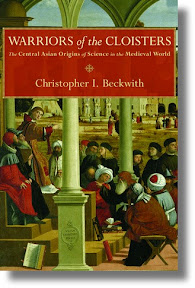Warriors of the Cloisters
Beckwith, Christopher I.:
Warriors of the Cloisters : the Central Asian Origins of Science in the Medieval World / Christopher I. Beckwith. - Princeton : Princeton University Press, 2012. - xvi, 211 S.
ISBN 978-0-691-15531-9 (Cloth)
US$ 29,95 / £ 19,95
ISBN 978-1-4008-4517-0 (eBook)
US$ 29,95
DDC: 509.580902
-- Angekündigt für September 2012 --
Beschreibung
Warriors of the Cloisters tells how key cultural innovations from Central Asia revolutionized medieval Europe and gave rise to the culture of science in the West. Medieval scholars rarely performed scientific experiments, but instead contested issues in natural science, philosophy, and theology using the recursive argument method. This highly distinctive and unusual method of disputation was a core feature of medieval science, the predecessor of modern science. We know that the foundations of science were imported to Western Europe from the Islamic world, but until now the origins of such key elements of Islamic culture have been a mystery.
In this provocative book, Christopher I. Beckwith traces how the recursive argument method was first developed by Buddhist scholars and was spread by them throughout ancient Central Asia. He shows how the method was adopted by Islamic Central Asian natural philosophers--most importantly by Avicenna, one of the most brilliant of all medieval thinkers--and transmitted to the West when Avicenna's works were translated into Latin in Spain in the twelfth century by the Jewish philosopher Ibn Da'ud and others. During the same period the institution of the college was also borrowed from the Islamic world. The college was where most of the disputations were held, and became the most important component of medieval Europe's newly formed universities. As Beckwith demonstrates, the Islamic college also originated in Buddhist Central Asia.
Using in-depth analysis of ancient Buddhist, Classical Arabic, and Medieval Latin writings, Warriors of the Cloisters transforms our understanding of the origins of medieval scientific culture. [Verlagsinformation]
Inhalt
Preface. ix
Acknowledgments. xv
Abbreviations and Transcription of Foreign Languages. xvii
1. Introduction. 1
2. The Recursive Argument Method of Medieval Science. 11
3. From College and Universitas to University. 37
4. Buddhist Central Asian Invention of the Method. 50
5. Islamization in Classical Arabic Central Asia. 76
6. Transmission to Medieval Western Europe. 100
7. India, Tibet, China, Byzantium, and Other Control Cases. 121
8. Conclusion. 147
Appendix A: On the Latin Translations of Avicenna's Works. 167
Appendix B: On Peter of Poitiers. 171
Appendix C: The Charter of the Collège des Dix-huit. 186
References. 187
Index. 199
Autor
Christopher I. Beckwith is professor of Central Eurasian studies at Indiana University, Bloomington. His books include Empires of the Silk Road: A History of Central Eurasia from the Bronze Age to the Present and The Tibetan Empire in Central Asia: A History of the Struggle for Great Power among Tibetans, Turks, Arabs, and Chinese during the Early Middle Ages (both Princeton). Profile page.
Quellen: Princeton University Press; WorldCat; Library of Congress; Amazon
Bibliographie: [1]
References
Ähnlich
- Het wiel van Ashoka
- Myers: German Visions of India
- L'esploratore del Duce
- Sir William Jones et la représentation de l'Inde
- Was ist Kulturwissenschaft?
- Turkestan-Expeditionen
- Empires of the Silk Road
- Pingree: Pathways into the Study of Ancient Sciences
- Purāṇas, History and Itihāsas
- Les intellectuels européens et l'Inde

